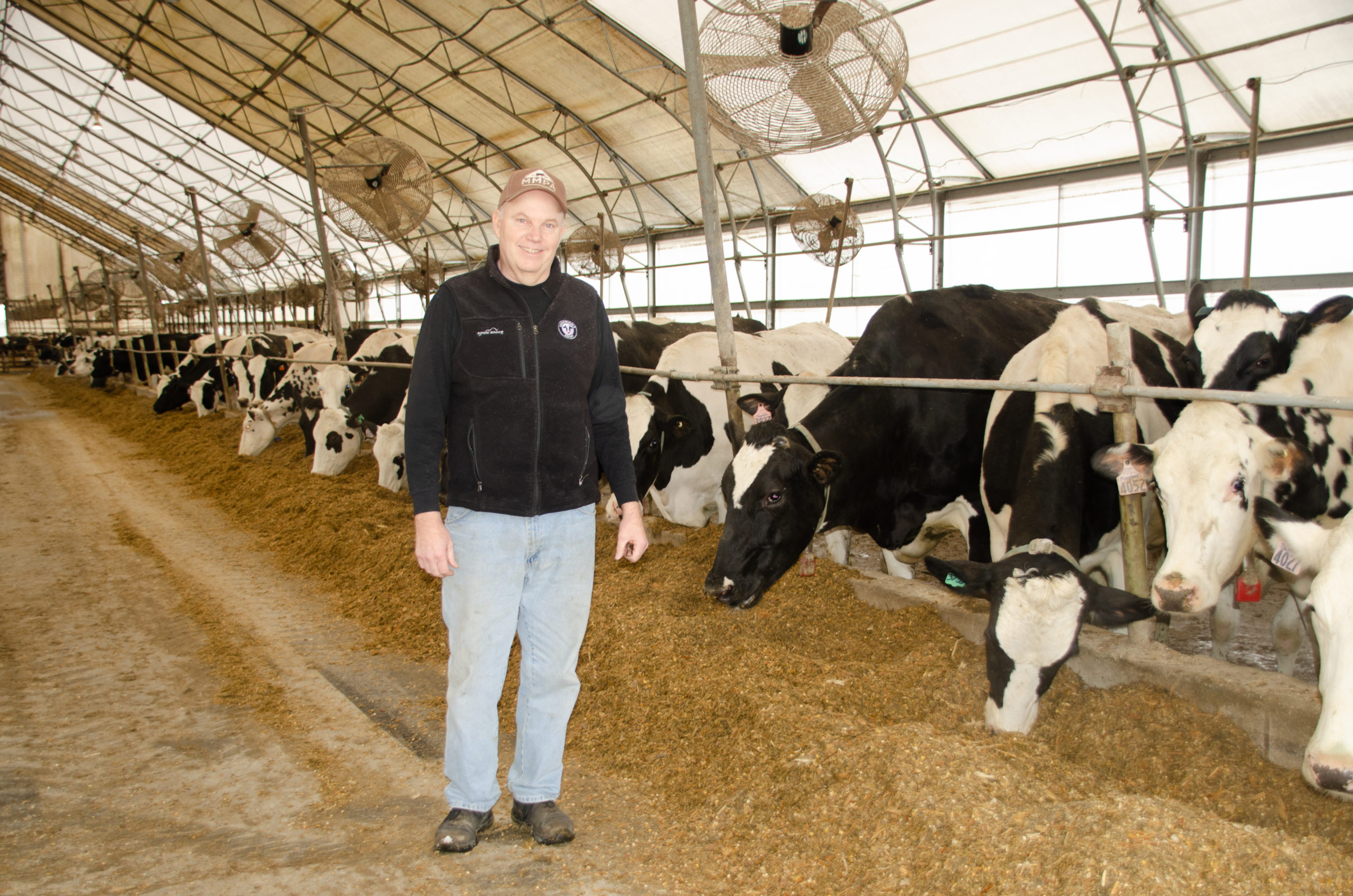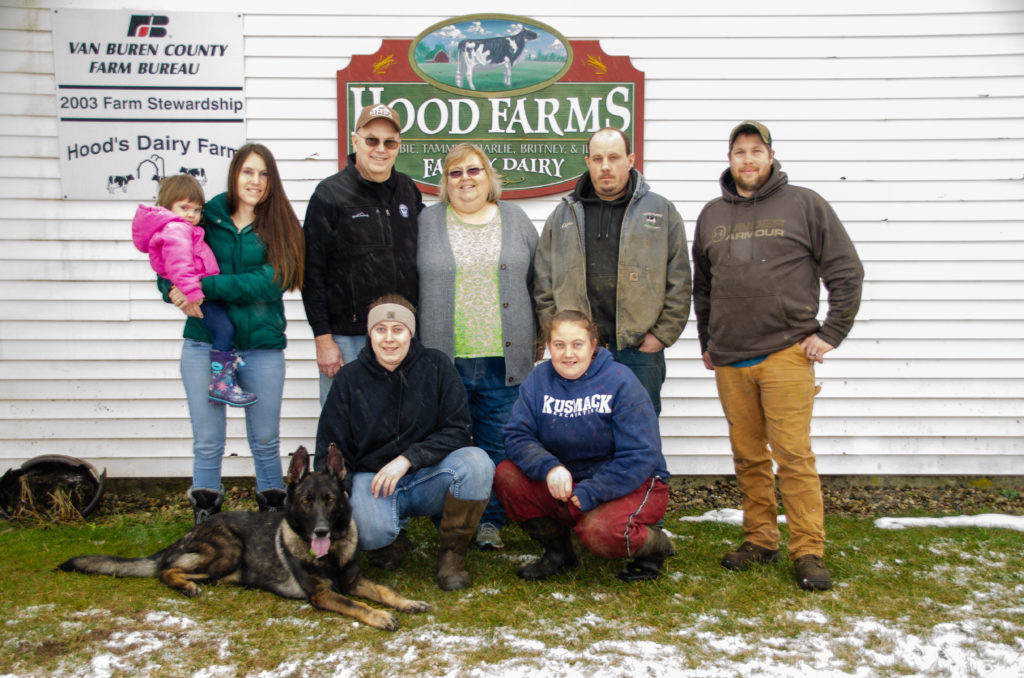Family roots run deep for many farms in the dairy business. Whether the farm has been passed down for numerous generations or it’s a newly established farm, the dairy is a fruit of family labor. For Hood Farms Family Dairy, generations have banded together to ensure the longevity of the 500-cow operation.
This family teamwork allows Tim Hood, the patriarch of the family, to spend time representing the dairy industry on a vast number of agricultural boards, including the MMPA Board of Directors. His dedication and leadership within the industry throughout these commitments is what most recently awarded him the title of Michigan State University Dairy Farmer of the Year.
“I’ve always been involved in the industry and I’ve always felt a commitment to help pay back,” Hood said. “When you’re involved, you learn that you can be a leader or a follower and there are only so many that lead. Everyone has to make that decision at some point in their life.”
What began as Hood leading his farm’s growth from 50 to 500 head in the late 1990s, has resulted in him leading the entire industry in the numerous positions he holds today. While he’s away from the farm, providing his input on the future of the industry, Hood relies on his family to “make decisions and do what they can back on the farm” while he is gone. He credits his ability to doing what he does today, strictly to their involvement on the farm.

A family affair
Hood’s son, three daughters and son-in-law all have a full-time role on the farm. Using each of their skillsets, they’re able to get the job done and have it done well. Speaking about the next generation on the farm, Hood said, “I think as long as you got somebody working for you that can do a better job, then I think you’re better off.”
When Hood isn’t on the farm, he’s driving to meetings where he represents dairy farmers throughout the region. Time in the car gives him the opportunity to sit back and think about his family’s dairy operation as a whole.
“I have more time to put into thinking about how we can make things easier for people and more profitable and efficient. That really helps,” Hood said. “I pass ideas onto people and see how they respond to them.”
Hood also provides a guiding hand as family comes to him with questions, problems and predicaments. To him, change and everything that comes along with change provides a learning opportunity that will help guarantee the success of Hood Farms Family Dairy in the future.
“We talk things over before we do things and that’s part of the learning process that I do with them,” Hood said. “I don’t just say, ‘I’m going to do this and regardless of whether it works or not, this is the way we’re going to do it.’ If nobody is interested or on board with it, we’re not going to do it. The excitement has to go beyond me. It’s my job to get them excited about things that I think will work on the farm.”

While there have been many things that Hood has gotten his family excited about, including hosting two Breakfast on the Farm events, one of the most recent exciting additions to the farm is an investment in a soybean roaster. The investment only came though after analyzing costs and deliberating with every member of the family.
“Last year we said that if we’re going to keep going in this industry, we have to learn how to reduce our costs. We looked at our biggest cost as feed and asked, ‘What can we do to reduce this?’” Hood said. “As a family, we had this discussion and we decided to look at how we would tackle it. What we ended up doing was purchasing a soybean roaster. This allows us to raise our own protein, instead of buying it. We’re not really far enough into it to tell, but we’re thinking our investment is going to be paid for in just a matter of months.”
Along with the financial sustainability this investment has incurred, it also has a profound environmental impact. It’s reduced the carbon emissions produced by the farm’s feed by reducing the amount of hauling necessary to roast soybeans. Instead of being hauled off site, the beans are roasted right on the farm’s property and fed to the cattle. The roaster also provides another crop to be included in the farm’s crop rotation, bettering the soil of the 1,200 acres owned by the Hoods.
Hood makes these investments intentionally, setting the farm up for success like he has since day one when he was milking 50 cows in tie stall barn with his dad.
Setting them up for success
When Hood turned 40, he participated in an MSU Extension program encouraging dairy operations to consider expanding in the future. With the help of MSU Extension dairy agents, he crunched numbers and determined that expanding was right for him.
“At the time, the kids were 8, 9 and 10 and that was part of the thinking,” Hood said. “I have this family, I had cows and I was currently squatting down to milk and my knees were getting worn. I didn’t want them to have to do the same thing I was doing, and I knew there wasn’t enough there to keep them interested.”
With family in mind, Hood grew his herd from 50 to 500 cows, building a new parlor, freestall barn, dry cow barn and heifer barn. Hood considers that expansion to be his contribution to the farm and is looking forward to the next generation making their mark by building a second freestall barn on the property.
Reflecting on the difference he has made on his family’s farm, Hood recognizes, “I couldn’t have planned it any better because they’re all here, staying on the farm, and that’s my ultimate goal.”
This article was originally published in the March/April 2020 issue of the Milk Messenger. Subscribe »

